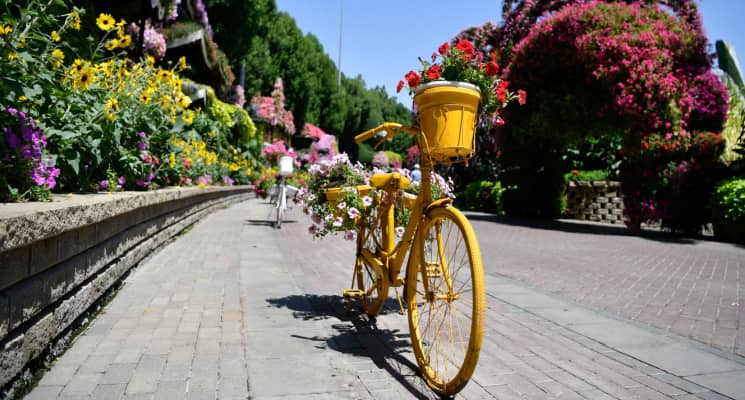Dubai residents can testify to the fact that the summer heat can sometimes be too much to handle. Although most residents can seek refuge from the heat in their air-conditioned havens, your garden in Dubai is not so lucky. Lawns, trees, and outdoor plants must endure the long, hot months with little break from the sunlight, high temperatures, and humidity.
ServiceMarket has partnered with the best gardening companies in Dubai, to answer some frequently asked questions and provide a how-to guide to save your garden from the harsh summer heat without breaking the bank with high DEWA bills and ensure that your foliage looks colorful all summer long.
- What is the best time of the day to water?
The best time to water is early morning before the temperatures begin to rise. This gives the plants a good supply of water to face the heat of the day. If you can’t water your plants in the early morning, don’t push it later than late afternoon.
- How frequently should I water my grass?
The best option is to water your garden in Dubai through an irrigation system. During the summer, this should be done twice every day for approximately 5 to 7 minutes each time. During the winter, it should be done on alternate days for 5 minutes.
> Find out how to keep ants from destroying your lawn
- Should I move plants indoors?
Outdoor tropical plants are best suited to areas where they can receive plenty of direct sunlight.
Many outdoor garden plants are actually warm weather perennials that will grow all year even if brought indoors. However, since plants placed indoors will get less light than those placed outdoors, it would be a good idea to go for shade-tolerant plants. Also, keep in mind that homes are cooler and less humid, so tropical plants moved indoors may need extra attention.
Generally, it is suggested that one shouldn’t bring outdoor plants indoors because insects may be lurking inside them. Before moving a plant indoors, make sure you check for any hitchhiking pests that may have made the plant their home. The two types of pests you have to search for are leaf-dwellers and soil-dwellers.
- How do I prevent my grass from turning brown?
Brown grass can be caused by insufficient water, weeds, disease, insects, and lack of nutrients.
To prevent your grass from turning brown, you need to focus on maintaining the grass regularly – remain consistent with watering, mowing, thatch removal, and aeration (which should be done once a year). Efficient irrigation is imperative to prevent drought stress in your lawn. To promote healthy roots, make sure you are mowing high. Furthermore, you should also make use of organic slow-release fertilizers – although they don’t have an immediate impact, they are better for the long-term health of your lawn. Make sure, however, that you avoid over-fertilization of the lawn.
- How do I prevent the ground from drying out immediately after watering?
There are several different things that you can do to prevent your ground from drying out soon. The most common method is longer but slower watering. This provides the ground with the same amount of water as a typical high-pressure sprinkler does but over a longer period of time. For over-exposed lawns, you can also consider applying soil-wetting agents.
You can also use a watering spike to keep the soil moist during extreme conditions. Furthermore, make sure that you eliminate all weeds from your garden since they cause the ground to dry out. A quick and economical alternative is to use a shade cloth/fencing to keep the ground moist during the summers.
- Is it worth investing in large shade trees? If so, which are the toughest?
Yes, a large shade tree provides relief from the heat of the summer. If placed properly, it can also lead to a significant drop in cooling costs in the summer. An ornamental tree provides beautiful flowers, leaves, bark, or fruit. Evergreens with dense, persistent leaves can be used to provide a windbreak or a screen for privacy.
Trees that can survive the harsh summer heat of the gulf include delonix regia, tabebuia argentea, and alstoia scholaris.
Want professional gardening help? Book a gardener from ServiceMarket now!







